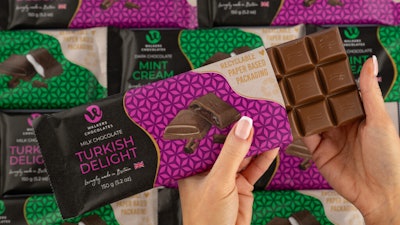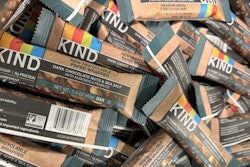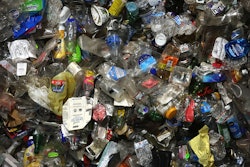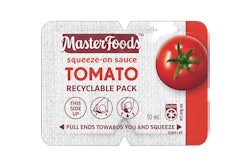
British favorite Walkers Chocolates is switching its popular own-brand Turkish Delight and Mint Cream chocolate bar wrappers to a 100% recyclable paper, RCM (recyclable, compostable, marine-safe) from EvoPak, made with hydrophilic polymer Hydropol by Aquapak. The bars will begin rolling out to selected Asda and Premier retail stores this month in the U.K.
“At Walkers Chocolates, we have a strong focus on sustainability and are committed to reducing our impact on the environment. As part this, we will move away from plastic to paper-based materials completely over the next three to five years where possible,” says Tom Murtagh, commercial director, Walkers Chocolates. “[This] announcement is an exciting step for the Walkers team with two our key customers and I hope is the start of a much bigger revolution in the chocolate category, and one which will be welcomed by consumers who can recycle the wrappers and know that no harmful microplastics are being produced at end of life.” Tom Murtagh, Commercial Director, Walkers Chocolates
Tom Murtagh, Commercial Director, Walkers Chocolates
This move closely follows a host of chocolate and confectionery swaps away from plastic into paper-based wrappers, including by both Nestle and Mars in Australia, and Mars candy bars in the U.K. As for the RCM with Hydropol film used in this Walkers application, The British Crisp Co. launched a potato chip bag in the same material, as reported in Packaging World in March. The paper can be used in a range of applications—from snacks and confectionary to pet-care and dry foods and cereals—and costs the same as existing materials, stakeholders say.
Unlike conventional paper packaging which often contains polyethylene layers to act as an OTR or WVTR barrier, consumers in the U.K. can dispose of the new Walkers’ wrapper in their normal curbside recycling collection along with their other paper recyclable items. Currently, it is only possible to recycle similar wrappers in the U.K. by returning them to store, which stakeholders say is inconvenient for consumers. And in many cases, where recycling processes aren’t carefully controlled, the wrapper still ends up in landfill or incinerated. Significantly, if littered, this new wrapper does not produce harmful microplastics when it breaks down which cause serious damage to the environment and animal health.
The new paper wrapper provides a functional and environmentally friendly alternative to current snack and confectionary packaging which, over the past 30 years, has become complex with the development of light weight multi-layer structures, the companies say. This has driven efficiency and shelf life, but the complexity makes them difficult to deal with at end-of-life. This is compounded by consumer consumption, which is often on the move, making littering a bigger problem than other formats. The other factor is that small units using a complex combination of materials makes recycling and recovery options currently limited, resulting in landfill with no circularity option.
Robust protective packaging with safe end-of-life options
To keep the chocolate fresh and in good condition in transit and on the shelf, the packaging needs to provide protection from oxygen, seal well on standard packaging equipment, and must be easy to print on. Hydropol provides all this functionality, stakeholders say, as well as offering multiple safe end-of-life disposal options for consumers and brands who want to help eliminate harmful plastic pollution.
Hydropol allows paper to remain fully recyclable and compostable and is even compatible with anaerobic digestion. Thanks to its solubility it doesn’t interfere with the recycling process and can allow up to 100% paper fiber recovery in standard mills.
Plus, if accidentally released into the natural environment (littered), Hydropol—which stakeholders claim is both non-toxic and marine safe—still has a safe end-of life and will dissolve and subsequently biodegrade. It does not break down into harmful microplastics either in the paper mill or if packaging it is not disposed of as intended. It is already being used in products such as garment bags, as well as the examples from chocolate and potato chip realms of food-contact packaging.
The wrappers have been certified as recyclable in standard paper recycling mills by OPRL, a British nonprofit that Auqupak calls “the only evidence-based on pack recycling labelling scheme.” This means they feature the green recycle logo and can be disposed of in consumer curbside collections along with other paper material.
Performs like plastic, recycles like paper
The research chemists from Aquapak who developed Hydropol say it’s a groundbreaking high-performance polymer that enables product and packaging design to meet all necessary functional and performance requirements, while increasing recycling, reducing harmful plastic pollution and supporting the circular economy. When extrusion coated or laminated onto paper, Hydropol adds strength and barriers to oxygen, oil and grease, and its solubility allows up to 100% paper fiber recovery through paper recycling mills.
“Today’s announcement marks a significant step by major retailers to move to fully recyclable paper packaging. With Brits consuming an average of three chocolate bars a week, the opportunity to reduce the impact on the environment by removing conventional plastics from this type of packaging, improving paper recycling and making life easier for consumers, retailers and brands is enormous. Aquapak’s Hydropol technology has made this possible and opens the door for many other categories to do the same,” concludes Mark Lapping, CEO, Aquapak.

























